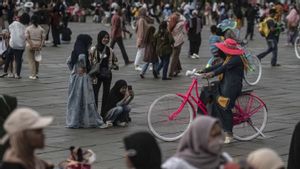JAKARTA People with disabilities contribute a high unemployment rate in Indonesia. So far, the government is considered to have preferred to approach quality-based or social assistance compared to empowerment-based, or empowerment.
Recently, social media was shocked by a viral video that tells how a disabled person works as a package courier at one of the freight forwarding companies.
He is Sirilus Siko, a blind person who delivers packages daily with sticks or cones. In addition, Sirilus Siko also modified his motorbike into three-wheeled which was used to carry customer packages in the East Surabaya area.
The man who is also an athlete of the Indonesian Football National Team Amputation admitted that he was happy to see the costume receive it when delivering the package.
"There is a nationality in itself after the customer smiled happily over the package he received," said Sirilus Siko.
But Sirilus Siko may only be one of the few people with disabilities who get a job to support themselves or not depend on other people's lives.
According to data from the Central Statistics Agency (BPS) in the 2020 National Economic Survey, 28.05 million people with disabilities were recorded. This number is equivalent to 10.38 percent of the national population, with the general majority likely at productive age.
Many of them are not ready to work due to the lack of proper opportunities, access, and accommodation.
According to Masykur Isnan, Advocates who specialize in labor law/Industrial relations, the high unemployment rate for disabilities creates an economic burden for the state. The government tends to overcome this problem with a priority approach, such as the distribution of social assistance (bansos). Even though distributing social assistance takes a fairly large budget.
Masykur Isnan continued, Law Number 8 of 2016 concerning Persons with Disabilities Article 53 has mandated a quota of two percent of disabled workers in government agencies and SOEs, as well as one percent in private companies.
Many parties, especially SOEs, have not met the quota of two percent. Meanwhile, private companies are questioning the incentives they will get if they meet the quota of one percent.
"BUMN is expected to be an example of the implementation of Good Corporate Governance (GCG) and compliance with the law as well as possible, but in fact this is still an unfinished homework," said Isnan in a statement received by VOI.
The problem was not resolved when people with disabilities were accepted for work. The government, state-owned enterprises, and the private sector do not yet involve disabilities in recruitment planning. As a result, job placement is often not in accordance with their types and levels of disability, and does not accommodate their special needs.
A disability organization, the Healthy Mental Association (PJS) encourages the government to fulfill its duties to fulfill work rights for persons with disabilities, as well as their protection and social security matters.
It was stated that Marsinah Dhede from PJS, the implementation of the 2011/19 People's Disability Rights Convention and the 2016 Persons with Disabilities Law number 8 so that people with disabilities enter the world of work are still very minimal.
"Industry Indonesia sees workers with disabilities will increase production costs, because indeed we hope that people with disabilities can fulfill their rights in the workplace to become more productive. But this is even considered to increase production costs," said Dhede.
He added that people in the industrial and state regime still see 'work' as a form of generosity for persons with disabilities. Whereas work is a right for people with disabilities, including women with disabilities.
SEE ALSO:
Meanwhile, Masykur Isnan emphasized the need for a change in the paradigm from capacity-based to empowerment-based. Simply put, assistance in the form of social assistance for persons with disabilities will be better replaced by making them empowered.
Empowerment of disability in the world of work not only solves their problems, but also provides benefits for non-disabled workers. Facilities and accommodation that are feasible for disabilities can also be enjoyed by non-disabled people.
This approach is also focused on increasing the capacity and independence of persons with disabilities in order to fully participate in the world of work.
According to Masykur Isnan, the government needs to be more assertive in supervising and imposing sanctions on companies that do not meet the quota of disabled workers. Strengthening the implementation of affirmative policies is important and necessary. In addition, other approaches can also be considered, including incentives for companies that employ and provide decent accommodation for disabled workers.
Governments and other stakeholders need to increase accessibility and accommodation in the workplace for persons with disabilities, such as providing disability-friendly facilities, supporting technology, and special training. Furthermore, encouraging SOEs, government agencies and the private sector to implement it comprehensively and systemically.
"With the increasingly empowered with disabilities, dependence on social assistance will decrease, the budget can be saved, the number of unemployed decreases, and HR productivity increases," said Isnan explained.
"The long-term impact, the economy will improve, the burden on the state will be reduced, tax revenue will increase, and the ideals of Indonesia Gold 2045 can be achieved," said Isnan.
The English, Chinese, Japanese, Arabic, and French versions are automatically generated by the AI. So there may still be inaccuracies in translating, please always see Indonesian as our main language. (system supported by DigitalSiber.id)







